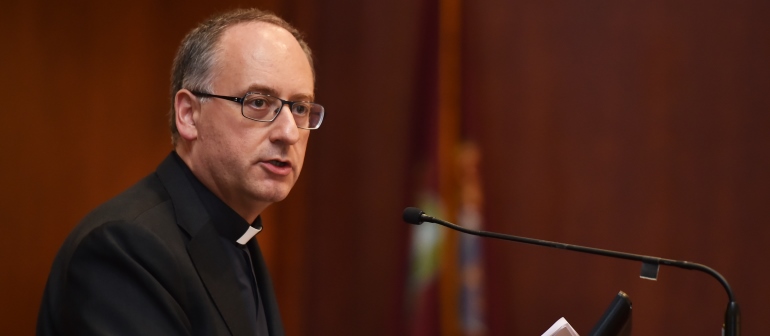Combating discrimination and prejudice in schools is crucial in building unity among all people and creating a just society said the editor-in-chief of the world’s oldest Jesuit journal.
Speaking at the 23rd annual Catholic School Executive Leadership Dinner hosted by the Graduate School of Education and the Center for Catholic School Leadership and Faith-Based Education, Father Antonio Spadaro, S.J., stressed the importance of unity through integration, education, and diversity among all people, regardless of faith or background.
Father Spadaro is the Editor-in-Chief of La Civiltà Cattolica, a Jesuit journal based in Rome that has been continuously published since 1850. He is also a Consultor at Pontifical Council for Culture and has published over 15 books, the latest being Cybertheology: Thinking Christianity in the Era of the Internet (Fordham Press, 2014).
Father Spadaro reflected on Pope Francis’s address to the United States Congress about immigration and migration, saying that “no one should feel like a stranger in the land of the free and the land of the brave,” a place with roots that are “mixed, complex, and multifaceted.” Only when we accept ourselves as immigrants will we accept ourselves and unite as the people.
The key steps to unity, according to Spadaro, are integration, education, and working with diversity.
Integration, specifically in school settings and especially for immigrant, special education, and marginalized students, is crucial in unifying the people. Spadaro focused on language and bilingualism as fundamental to integration. Learning a language creates a bridge to a new culture and its people. “To help someone learn a language means to help people develop in their relationships with the world,” Spadaro said.
Education is paramount in improving ourselves, building the nation, and building the future — there is no community without education. Quoting Pope Francis, Spadaro said “our educational task must awaken the feeling of society as home. Education serves to inhabit the world as a home.”
Additionally, there is no the people without working with diversity. People are dynamic and, again quoting Pope Francis, Spadaro said “the culture of a people does not consist of the frozen repetition of itself. It is an open process that tends to open, to integrate, to multiply, to share, to dialogue, to give and to receive.” Schools, he continued, must lead the way in working with diversity.
He invited attendees to build up diversity of our communities and create unity “on the basis of our diversity of languages, cultures, and religions. We must lift our voices in the way of anything that stands in the way of that unity.”
The annual leadership dinner honors people and programs who are doing exceptional work on behalf of all students and families, particularly underserved and marginalized groups. This year’s awardees included the following:
Peter Fusco, Notre Dame-Bishop Gibbons School (Diocese of Albany)
Sr. Patricia Mary Lynch, RSM, Blessed Sacrament School (Diocese of Albany)
Stephen Anderson, St. Joseph School (Diocese of Bridgeport)
Patricia Griffin, St. Ann Academy (Diocese of Bridgeport)
Rudolph Cyrus-Charles, Saint Gregory the Great Catholic Academy (Diocese of Brooklyn)
Linda Freebes, Sts. Jocachim and Anne Catholic School (Diocese of Brooklyn)
Leona Arpino, Maria Regina School (Diocese of Rockville Centre)
Fr. Elias Carr, All Saints Regional Catholic School (Diocese of Rockville Center)
Darlene Delvecchio, St. Patrick School (Archdiocese of New York)
Diverse America, Office of the Superintendent of Schools (Archdiocese of New York)
Sr. Jacquelyn Balasia, Mother Seton Regional High School (Archdiocese of Newark)
Mary McErlaine, Mother Seton School (Archdiocese of Newark)
Dr. Diane Rodriguez, Associate Professor of Curriculum and Teaching and founder of Every Girl is Important

